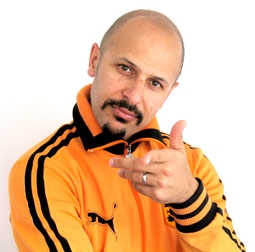
Comedian Maz Jobrani honed his character acting chops in films like The Interpreter, 13 Going on 30 and Friday After Next before joining the cast of ABC's hilarious new sitcom, The Knights of Prosperity. The show is truly reminiscent of sitcom styles from the 70s and 80s, with a simple and humorous premise that is executed to perfection. The Knights of Prosperity has an ensemble cast where every comedic note plays like the keys on a finely tuned piano.
A group of minimum wage blue collar working stiffs devise a plan to finance their dreams of financial freedom by robbing Mick Jagger. The plan is hatched after Eugene Gurkin (played by the hilarious Donal Logue) watches a special on E! Entertainment Television in which Mick is giving a tour of his lavish New York City Penthouse. Maz Jobrani plays Gary the Indian cab driver, and one of the five members of "The Knights of Prosperity," who, incidentally, hold their regular strategy sessions inside a Jewish supply warehouse. Sprinkled with silly and unexpected celebrity cameos and intellectual pratfalls, each episode brings the Knights one step closer to their end goal of robbing Mick Jagger.
When I caught up with Maz, he had just spent several days at The Sundance Film Festival in Park City, Utah, where his sister was screening a documentary. We talked about his show, The Knights of Prosperity, his experience at The Sundance Film Festival and his comedy troupe, The Axis of Evil Comedy Tour in which he and the rest of the comics on the tour are hoping to bridge gaps and create a better understanding of Middle Easterners here in the United States. Our conversation ping ponged between the topics of entertainment, and political and social strife.
PR.com (Allison Kugel): Are you at Sundance right now (The Sundance Film Festival)?
Maz Jobrani: I was. I came back early.
PR.com: Why'd you come back early? It wasn't fun?
Maz Jobrani: Oh it was too fun. One day at Sundance is like a week in your life. Have you ever been?
PR.com: No. What goes on?
Maz Jobrani: I didn't know what to expect at all. I just went because my sister's film was in there. They've taken one of those main streets, it's a small ski town, and all of a sudden it feels like everyone from New York and L.A. who is in the business … they're there just to be seen. I don't even know if they have projects. All of a sudden it's like this hipster place. It's funny because since I do stand-up I don't usually go to, like, the hottest nightspots. I just don't end up all the time at this hot club here or that hot club there. Over there it was all kind of like that. All of a sudden there were ropes and security at the front, and "whose list are you on?" and all of that stuff. There's also skiing there but nobody skis. Everyone's there to schmooze and everything, so nobody's skiing.
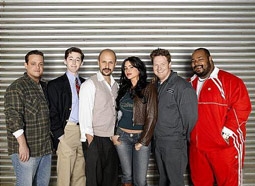
PR.com: Is everyone dressed in their ski gear, just kind of standing around?
Maz Jobrani: No, no. it's actually wintery clothes. It's not their ski gear.
PR.com: (Laughs.)
Maz Jobrani: Yeah, that would be very weird.
PR.com: I know, but I wouldn't be surprised…
Maz Jobrani: Yeah of course, to look hip (laughs). It was funny 'cause we had the mountain to ourselves, because some people were skiing but not a lot. So we'd go skiing during the day, and then in the afternoon we'd head into Main Street, in the town. Since we were there for my sister's thing, a lot of family and friends had come, so we'd go have dinner and party together and then end up going to some club and just on and on and on. But everyone I ran into was like, "Yeah, we don't get much sleep." We were supposed to be there for a week and there's no way you could do it for a week. And even though there are lists and stuff [for events], if you're on the list, I was on a bunch of lists…plus one. But I would show up with my posse, and it was funny because most posses consist of guys and they're trying to pick up girls. My posse, I'm married and my wife didn't come, so my posse was my mom and my aunts…
PR.com: (Laughs) That's your entourage…
Maz Jobrani: Yeah, my entourage was all these women with me, and then of course I had a few friends as well.
PR.com: I watched the first three episodes of your show, The Knights of Prosperity. I'm one of those people who's always complaining that television isn't like it used to be in the 70s and 80s, kind of that classic feel. I feel like your show has that classic feel to it. It's a brand new show obviously, but it looks and feels…it has a classic quality to it.
Maz Jobrani: I kept trying to figure out the best way to describe the show. While we were filming it, I was like, "This is kind of like the modern-day Taxi." Even our little cave that we have is kind of like our office. It's kind of like Taxi meets The A-Team. When I saw the first promo that they showed at the Up-Fronts (where television networks present their season's line-up of shows to advertisers) for ABC, I was so excited because the promo they had shown…they chose to make it look like a real heist. It did kind of have that 70's feel to it.
PR.com: And also the premise is so clever. It almost reminds me of when you go to see one of those sleeper hit movies like My Big Fat Greek Wedding or something that totally catches you off guard because you couldn't have thought that up in your wildest dreams.
Maz Jobrani: If I get a script and I read it and I'm laughing out loud, then I know that it's a funny, funny script. That doesn't happen a lot at all; since I do stand-up as well. Stand-up is just kind of … you don't get jaded but your like, "that's funny," but you don't really laugh. And ABC said they're onboard and they're supporting [the show], and I hope they keep doing it.
PR.com: How would you explain, from your point of view, the premise of The Knights of Prosperity for people who haven't seen it?
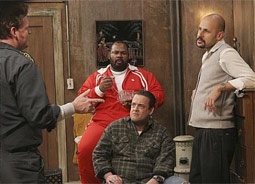
Maz Jobrani: The way I always explain it to people is I say it's kind of like Ocean's 11 but with bumbling idiots, or it's like The Roadrunner, where Mick Jagger is "The Roadrunner" and we're the "Wile E. Coyote." We just keep messing it up. It's just a bunch of normal guys who are down and out in New York City and they decide to subsidize their dreams by going for a heist, and the heist is robbing Mick Jagger.
PR.com: There's this beautiful woman who is in your cast…
Maz Jobrani: Sofia Vergara…
PR.com: Yes. It's so funny because whenever I think of the name now, I don't think "Mick Jagger," I think "Mick Yagger," with a "Y," because of her Latin accent. In the first episode you have the character Eugene Gurkin, who is played by Donal Logue, and he's watching an E! Special where they're showing Mick Jagger and his big amazing penthouse in New York. It's kind of like an MTV Cribs kind of a thing. Do you think those shows instill a feeling of entitlement or a sense of jealousy among people who are not economically advantaged, let's say?
Maz Jobrani: It's a comedy and that's what's beautiful about it. We kept talking about this. These guys are doing something that's really bad. They're robbing somebody. But you can't help but root for these guys because they're so lost. They're not idiots, but they're not skilled and they're all very pure and childlike in a way. Let's just say, if you were somewhat sophisticated and you really were going to try and do a heist, you might say, "Let's research this. Let's go online and see what you would do." If you were a little bit more sophisticated, you might actually have a longer thought process. You might, like I said, go online and figure out … well maybe it's actually better to try and do credit card fraud or something…
PR.com: (Laughs.)
Maz Jobrani: I don't know! (laughs) You know what I'm saying. If you were somewhat sophisticated, that might be the route you would go. But these guys are these total underdogs who all have their own reasons and they're good people. So it's not the feeling of jealousy like, "That bastard. I should get what he has," as much as "Hey, this guy's got so much. He's not gonna miss it." That's why it's so much fun, because these guys are like, "Look, if we took a painting from [Mick Jagger's] house that's worth probably five million dollars, he won't even blink twice. It's not gonna hurt the guy." That's the thought process these guys have, so I don't think there's a dark energy at all in this.
PR.com: Is David Letterman one of the producers of the show or an executive producer?
Maz Jobrani: The production company for The Knights of Prosperity is World Wide Pants. Rob Burnett was an executive producer at Letterman's company, and John Beckerman was one of the head writers for many years. So those two guys now are a part of World Wide Pants and I believe that World Wide Pants also had produced the show Ed. Now this [show] is another one that World Wide Pants is producing, so David Letterman is an Executive Producer on it. And actually the music for The Knights of Prosperity was composed by Paul Shaffer (David Letterman's band leader and sidekick).
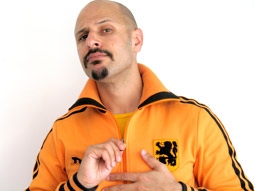
PR.com: The entire first season of the show is kind of set up like a serial where one episode leads into the next, correct?
Maz Jobrani: Yeah, it is. And that's where again, thank God ABC's got it on ABC.com, where people can go and catch up. I don't know if it makes sense if you were to start on episode five. I don't know if you would get it or not unless you knew what the premise was. We shot 13 episodes, so in 13 episodes, we're going after Mick [Jagger], and there are other celebrities that will pop into the picture down the line. In one of those earlier episodes, I think episode 2 where we're having a brainstorming session, I was suggesting we rob Fran Drescher.
PR.com: Oh yeah, I remember that! (laughs) Was it you who said, "She's got all that Nanny money?"
Maz Jobrani: No, I go "Let's rob Fran Drescher!" And then Rockefeller Butts (played by Kevin Michael Richardson) goes, "She's got that Nanny money."
PR.com: (Laughs) I think if you skip episodes you'll know what's going on. You'll just miss whatever progress they made, in their quest to rob Mick Jagger, the week before. But I think everybody should definitely see that first episode because it lays the groundwork. But people can catch up online.
Maz Jobrani: You're right. people do go online (www.abc.go.com) and catch it, or they catch up on some DVDs and then they go, "Ok, now let me see where we're at…"
PR.com: It's funny, because now it's a DVD culture. People get the DVD of a whole bunch of seasons and just watch everything in one straight run.
Maz Jobrani: A lot of people do that with the TV show, 24.
PR.com: At the end of the 13 episodes of The Knights of Prosperity, obviously you don't want to say exactly, but is there some type of resolution to what they're trying to do?
Max Jobrani: A season is 22 episodes, I believe. ABC has ordered the back 9 scripts to be written. Now we're on hiatus waiting to find out, hopefully, when we will be shooting the [additional] 9 episodes. We've filmed up until a little past the middle of the season. So there's no final resolution yet.
PR.com: And you tour with a comedy troupe?
Maz Jobrani: We perform stand-up all the time. My home club is The Comedy Store, which is Mitzi Shore's club; she's Pauly Shore's mom. She put us together. When you're a regular at the club, you perform on any night, with any lineup. What Mitzi would do from time to time is, she would get a group of let's say … black comics … she would do "Black Comedy Night," "Latino Night," or "Women of The Comedy Store." She's Jewish and around the year 2000, she watched CNN a lot, and she started seeing that there was this new [conflict] there is the Middle East between the Palestinians and the Israelis. She said, "You know, I think something's going to be happening in the next few years…" This was before September 11th but right when the Israeli and Palestinian [issue] started heating up again. So she said, "I think there's going to be a need for a Muslim voice to be out there. Not just Muslim, but a Middle Eastern voice to be out there to counter the negativity." And we always say that [Mitzi Shore] is kind of like a "Yoda." She kind of sees the future, almost.
PR.com: Yeah, that's kind of prophetic.
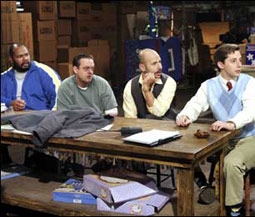
Maz Jobrani: Yeah, she really is. The way the stories go, she kind of helped Roseanne [Barr] create her character and that's where Andrew Dice Clay created his character … at The Comedy Store. A lot of the people who evolved came through there, and she had some ideas for a lot of them and helped them create their characters and their voice. I was the only Middle Eastern comic who was a regular at the club, and then she found a few others, one of them being this guy, Ahmed Ahmed who is Egyptian American. There's another guy named Aron Kader who is Palestinian. Mitzi Shore put us together in this group called Arabian Knights. As it went on, Ahmed, Aaron and I kind of broke off and started doing our own thing. Our community came out and was supporting it hardcore, because I think that people saw that there was so much negative depiction of Middle Easterners in the media. When we first started doing the shows and traveling, a lot of the crowds were mostly Middle Eastern. As we kept going, it started to mix up. It wasn't until November of 2005 that we had been throwing around this name, starting to call it The Axis of Evil Comedy Tour. The reason we wanted to change it is because Iranians aren't Arab…
PR.com: Out of curiosity, what is the definition of an Arab?
Maz Jobrani: Arabs, I believe, are Semitic. Arabs are the Saudis and Iraqis and Egyptians and Palestinians and Syrians. All those countries … Lebanon … they're all Arabs. They speak Arabic. They are ethnically Arab. But Iranians, actually the word Iran comes from "Arian." Iranians are Caucasian, ethnically. A lot of Iranians get snooty about, they're like, "No, no. We are not Arab. We are Persian." And I'm like, "Listen dude, we're all getting persecuted. We're all in the same boat." I do a joke on stage about like, the only way you can tell the difference is in our accents. Iranians talk a lot slower. They talk like deeeees (allowing an accent to break through into his speech). Like I say, maybe they shot some heroin and dey r falling az-leeeep (laughs). Arabs talk a lot faster, like they did some cocaine and they are talking to you; that kind of thing. So there is a difference. And Iranians speak Farsi. That's why also right now, politically, there is that whole thing where the Saudis don't want the Iranians to have control and to have too much influence in the Middle East.
PR.com: Is Iran mostly Muslim?
Maz Jobrani: Iran are the Shiite Muslims. Iran is mostly Shiite Muslim. That's the whole thing in Iraq. The majority of Iraqis are Shiites, but Saddam Hussein was Sunni. So the Sunnis who were minority were running the country under Saddam. And I don't know if there was flat out persecution of Shiites, but I'm guessing like in any of these struggles, the Shiites probably, there was this whole thing with Suddam where some Shiites tried to assassinate him. Then his people massacred these Shiites. The simple way of describing it is like saying Protestant versus Catholics. After the prophet Mohammed died, they all feel that there's a split. The Sunnis feel that this one guy Abu Bakr was the proper next leader of the group. The Shiites believe that Ali was the next profit, so there's that divide. Then it gets murky and they just start fighting each other.
PR.com: I've never seen a religion that's so politicized and manipulated as the Muslim religion. It's just very interesting to me the way it's been used throughout recent decades to serve different people's interests. Even just going back to our own history in the United States, the way "The Nation of Islam" used it with Malcolm X and then the way people are using it in the Middle East. I think there are a lot of misconceptions. Now when people hear the word "Muslim," it automatically has a stigma attached to it.
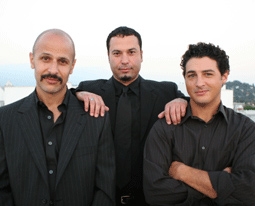
Maz Jobrani: I think you're right in that … that's what we're trying to do on stage. I emphasize the fact that I have Jewish friends, I have Christian friends. That's not an issue at all. The only way it ever comes into play is when we are just teasing each other and having fun with each other. It's your buddy, so you make fun of them, and you say something related to his religion or whatever. I never feel like it's us against them. They are me. I get discouraged when I see this kind of stuff. Like you said, it's constantly getting politicized, and it's the same thing now with Iraq, with the Shiites and the Sunnis. You're all Muslims and yet you decide to fight. It's a manipulation by politicians. A lot of times religion is a good manipulating force in that a lot of people who are poor, who have no hope, religion is a great way to go, "Hey, you know God is on your side. God is telling you it's right to kill that guy because he doesn't believe in your God." I was talking to some guy who was a soldier, and he was at Sundance. The pawns are the soldiers. The pawns are the women and children that get killed in the middle of all this. It's so easy to manipulate a religion to use it for political reasons. We do it in America. The words democracy and freedom, I think, were manipulated to go into Iraq. I'm just saying, "Don't lie to me." I just don't think the intentions are that pure. Otherwise the administration is just naïve. That's what we try to do in our stand up [comedy] is to talk about some of these things; if there's a hypocrisy. I think that one of the jobs of a stand-up is to expose hypocrisy. If we can do that and make people laugh while doing it, then it's great. We hope to do that with The Axis of Evil Comedy Tour. We just got a release date; we are supposed to be on Comedy Central on March 10th.
PR.com: Did you decide to call it The Axis of Evil Comedy Tour as a way of diffusing hostility towards Middle Eastern people, or disarming people?
Maz Jobrani: Absolutely. The reason we chose that name, The Axis of Evil Comedy Tour … I always say it's kind of like when black people say that using the "N" word diffuses it. Now there's been a whole controversy…
PR.com: Oh God (laughs) Yeah, yeah…
Maz Jobrani: When I first heard that term, "The Axis of Evil," and I'm watching [George] Bush talk about it on TV, I'm thinking, "This is so ridiculous." I understand his intention. I don't support the government of Iran and what they talk about in, you know, when the President comes out and denies The Holocaust; I'm just like, "Come on. Stop talking gibberish." I don't support them either. But Bush was saying in his speech, "For the people of Iran, we are with you. It's your government we have a problem with." Well unfortunately, when he puts Iran in "The Axis of Evil," most Americans probably think any Middle Easterner rides on camels and is smarmy and wants to blow himself up. Again, I know that a lot of people are educated and know those aren't the facts, but I am shocked sometimes by what people say to me or by what I see sometimes on TV.
PR.com: Do you think that there is a big difference between the beliefs of the Iranian government versus the beliefs of the people?
Maz Jobrani: Oh, absolutely. I actually went back and visited about eight years ago. I bought into the things I would read here. I get into a cab and cab drivers were complaining about the government. My dad took me to this sauna/steam room where these guys were talking politics. Everyone was highly critical of the government. With most Iranians, I don't think that a war is on their mind even though the U.S. is moving navel vessels into the region. I think that most Iranians, with the advent of the Internet, are very aware of what is going on in the United States. I did the film, 13 Going on 30, and my aunt got it on DVD before it had come out here. She got the bootleg version. There's a whole culture of Iranians loving the west, and Iranians loving freedom.
PR.com: I know that you moved to the United States when you were six years old. Why did your parents choose to move to the U.S.?
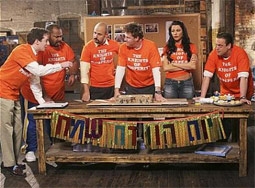
Maz Jobrani: My father was a successful businessman in Iran and so at that time he had a lot of friends in the government, whether they were military or whatever … he was well connected. After the revolution there was a witch hunt for anybody that had anything to do with the regime. We didn't know if it was safe for him to be [in Iran], and he wasn't in the regime at all, but he had friends and associates and he was a successful businessman. Furthermore, there was also a revolution going on in the country and that was followed by an eight year war with Iraq. There was a way you could pay money and not have to do military duty, but I don't think my father wanted to risk that for his kids. So he moved us to the United States. At that time the people who could afford to move did move. And that's why right now I think there is a stereotype that Iranians are all rich, because the people who moved out here were all rich. The people who couldn't afford to move stayed there. Also, my family had been very secular, always. We've never been that religious. We wanted to live our lives and if I wanted to have a drink, then I wanted to have a drink without having to deal with the oppression that was going on there. It had seemed to have gotten really bad [at the time]. There's this book that this woman wrote, where she did it in a cartoon format and she talks about her life and her experiences in Iran and how suddenly there was a religious police. You would walk down the street and if your hair wasn't covered enough they would scold you, and if you talked back they would take you to prison.
PR.com: That's what goes on now?
Maz Jobrani: Not as much. It's much looser now. The women aren't supposed to have makeup and show their hair and all that other stuff. It's funny, women have turned that into a style now. Rather than covering themselves, they'll be covered, but their hair will be coming out the front. It will be all made up and ready to go. The thing that I was hearing was, if they had to go out they'd cover themselves, but then when they'd go indoors to parties they'd take that thing off and it would be like New York City. Women would have mini-skirts and just enjoying themselves and people would be having a good time at a party behind closed doors.
PR.com: I have to be honest, when I see a woman dressed in the traditional Middle Eastern garb, where her hair is covered and sometimes part of her face is covered, it really does something to me. It really angers me. I get a strange feeling inside. I guess that's the feminist in me coming out.
Maz Jobrani: I understand that. I am very liberal minded in my ways. I went to Berkley and I feel like, "live and let live." Anybody should be able to do whatever they want to do. I hear some women say, and I don't get the argument, but they say that they feel more liberated in that because then they're not being judged for their sexuality. I don't agree with that but that's what they say. If it's somebody's choice to do it, then go for it.
PR.com: I just wanted to set the stage as far as the comedy show and the issues that are behind it and what you guys are trying to accomplish, and why it needs to be accomplished in the first place.
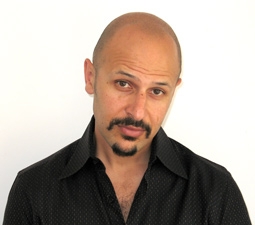
Maz Jobrani: You turn on the TV and anytime you see any
Middle Easterners, another bomb went off; another guy took a hostage.
I talk about it on stage as well. I look around and most Middle Easterners
I know are good people. They're doctors, lawyers, businessmen, fathers,
mothers … they're just regular people. If you were to take one million
Middle Easterners, I would say that 999,990 are good people. Ten of them
are going to be criminals. Ten of them are going to be terrorists, or
whatever. So, it's a disproportionate image of us that you see and it's
for obvious reasons. Because that's where the turmoil is and that's who
the terrorists are. But unfortunately we aren't prominent enough …
I feel that the biggest PR machine in the world is Hollywood. Because
there's not that many Middle Eastern [movie stars] you don't have a Middle
Eastern Tom Cruise. So we're just chipping away at it. We say, "Hey,
come see the show. We're American. We're good people. Everyone in the
audience are good people." There's Jews and Muslims and Christians
all sitting next to each other and we're having a good time.
